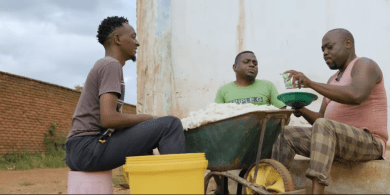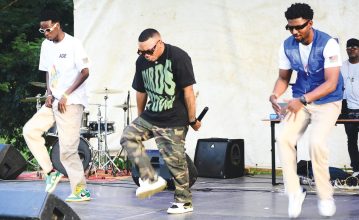Shaping language with local celebs
Have you ever wondered why a type of locally made clogs are called Gwaladi? Or the big and hard milk scones called Gaba or Chi Gaba in Malawi?
Language is changing every day. And in Malawi, new words are being assimilated into our everyday life.
Apart from borrowing words from other languages, there are popular words that are being coined locally and have become part of our daily communication. Interestingly, these words are associated with our popular celebrities such as musicians and footballers.
An eponym refers to a person whose name is the source of a name of someone or something. In Malawi, there are several eponyms which are shaping our language and communication today.

These include musicians Joe Gwaladi and Skeffa Chimoto, and footballer Frank ‘Gabadinho’ Mhango.
For example, Gwaladi has become a source of the name of popular clogs which are widely known as Gwaladi. Gabadinho Mhango is an eponym of big milk scones popularly known as Gaba while musician Skeffa Chimoto has become the eponym of a bus stage called Pa Skeffa in Area 25 in Lilongwe.
When you board an Area 25-bound minibus or taxi from town via Area 49, you will likely hear a passenger advising the conductor or driver, “Titsike nawo pa Skeffa” [I will drop at Skeffa Chimoto stage]”. This is a new popular bus stop near the house of the musician Skeffa Chimoto.
Likewise, some people have become eponyms due to their achievements globally. So does Skeffa Chimoto who is
one of the country’s successful musicians.
“Pa Skeffa has become a popular bus stop just like any other bus stops in our location. We are happy because this stage has been named after our beloved musician Skeffa Chimoto,” said Leonard Davie, a taxi driver.
In an interview, Chimoto said he was humbled that a bus stop has been named after him.
“I don’t take this for granted because this just tells me how people like or perceive my name. It feels great and normal to me now,” said the artist of Nabola Moyo fame.
The story behind the clogs is simple. Musician Joe Gwaladi is popular across the country and his music is affordable. One can buy a CD from Joe Gwaladi as low as K300. Oh yes, Gwaladi sells his music himself through a public address system mounted on his bicycle.
Therefore, the clogs, which are cheaper and popular countrywide, are likened to Gwaladi’s cheap CDs. Essentially, any popular but affordable product such as clogs resembles Joe Gwaladi’s music.
Another explaination is that when a young Gwaladi went to then Televsion Malawi for an interview, he was wearing the clogs; hence, the nickname to the shoe.
It is known that Gabadinho is one of the lethal footballers from Malawi. When he is in the field of play, he is always running up and down and connecting crucial crosses as well as scoring marvellous goals. Given the opportunity, Gabadinho finishes the whole 90 minutes of the game. Therefore, his enduring spirit is likened to the milk scone which is called Chi Gaba. People can have one Chi Gaba with tea in the morning, and stay up to lunch without eating anything.
“Chi Gaba milk scone is cheap and it makes our life easy as far as spending is concerned. With only K250, you are assured of working the whole day without feeling hungry. With Chi Gaba, we really work hard like Gabadinho in the field of play,” said Edward Nsomba, a vendor from Lilongwe’s Tsoka Market.
Other musicians in Malawi have simply created new meanings of already existing words. For example, Kunyapa or Kupanda is a Chichewa word which means “to beat”. But musician Diktator uses the word to mean “singing well”.
Kuswa in vernacular means ‘to break’ something, but it has taken on a new meaning in music to mean playing good music.
Other popular places have also become sources of the names of bus stops in our cities and townships. These popular names include Pa Chimtengo, Pa Manda, Pa Mbuzi, Pa Zinyalala, Pa Corner, Pa Mateyala, Pa Galaja, among others.
Internationally, some people have become eponyms based on their inventions. For example, the popular ride Ferris Wheel is derived from its inventor George W. G Ferris.
Similarly, Samuel Maverick was a Texas cattle rancher, who unlike his fellow ranchers, refused to brand his cattle. These unbranded cattle became widely known as mavericks, and today the word maverick has come to mean anyone who refuses to go along with the group.
Indeed, just like other countries, Malawi is making history and shaping language and communication with her celebrities every day.





